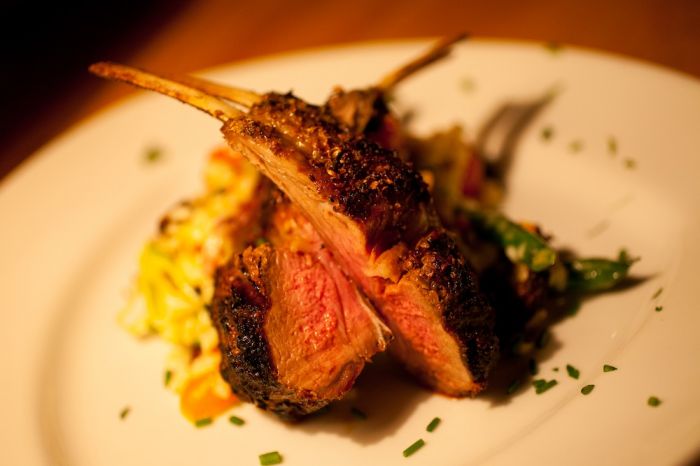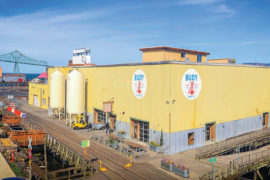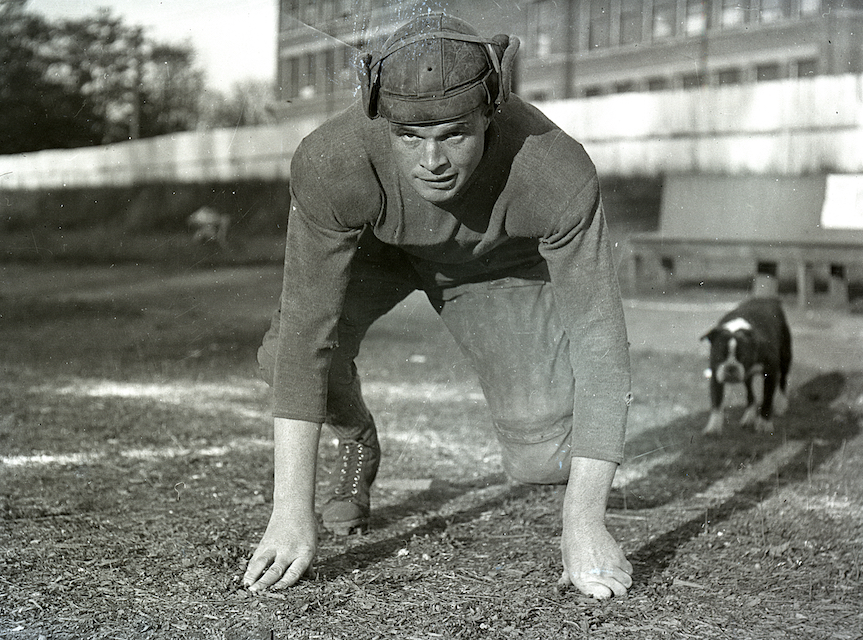Kermit the Frog may have been onto something when he said it’s not easy being green. Committing to greener practices may mean additional costs when the business buys organic or recycled products. Extra effort is expended composting and recycling. Still, it’s an investment in a healthier future and many Oregon wineries are committed to the cause.
THE EARLY ADOPTERS
The Sokol Blosser family has always been conscientious of the impact that farming and wine production has on the environment. Before green practices were trendy, the winery gave back to the land. In 2002, Sokol Blosser became the first winery in the United States to earn LEED (Leadership in Energy and Environmental Design) certification for their underground barrel cellar. The wines age at a constant 55 degrees without any heating or air conditioning.
From USDA Organic Certification to bio-diesel tractors and trucks, Sokol Blosser maintains their commitment to using good-to-the-earth practices. In 2006, Sokol Blosser installed a solar array that supplies 25 percent of the facility’s energy needs.
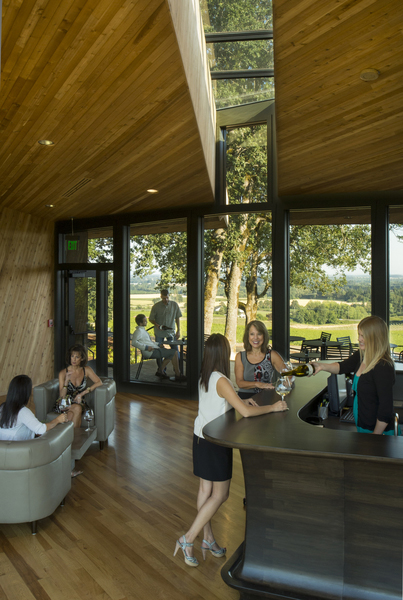
Photo by Andrea Johnson
ECO TRAVEL
Making sustainable decisions has been a priority for Winderlea Vineyard and Winery from the start. According to owner Bill Sweat, “Back when we built our tasting room in 2007-2008 we installed an EV [electronic vehicle] charger, one we think may have been the first at an Oregon tasting room. Sometimes, as in the decision to install EV chargers, it might not result in an immediate reduction of our own carbon footprint, but it does advance a broader cause and we believe will pay off in the long run,” said Sweat. Oregon is a leader in the country in EV infrastructure. Places like Winderlea make it easy to take a wine tour throughout the great state of Oregon, and charge your EV (or a rented EV) along the way.
Elk Cove Vineyards also hosts an EV charging station. Vice President of Sales and Marketing, Shirley Brooks, told us, “Elk Cove recently underwent some construction and in keeping with our philosophy of advancing more sustainable options, it was an easy decision to add a charging station here for our likeminded customers. What better reason to give them to than to stop and ‘charge up?’”
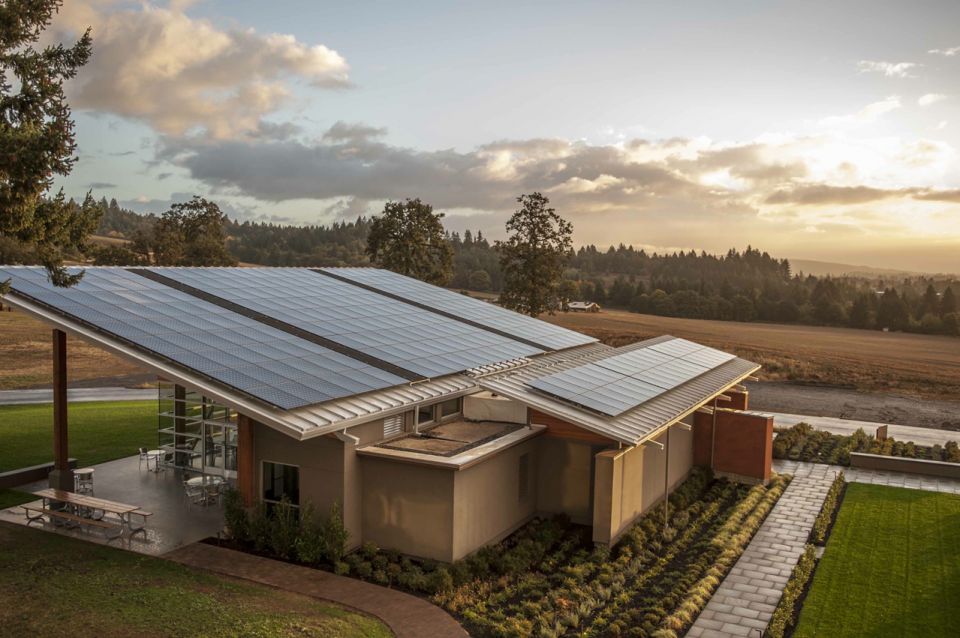
Other wineries with EV charging stations include King Estate Winery, Eola Hills Wine Cellars, Stoller Family Estates and The City of Elkton in Southern Oregon (allowing access to Elkton AVA wineries). It would be possible to explore all of Oregon’s wine country west of the Cascades without ever purchasing a tank of gas. Road trip, anyone?
WELL-ROUNDED GREEN
Over the last twenty-plus years, founder Bill Stoller has transformed the Stoller family farm into one of the leading vineyards and wineries in Oregon and a model of sustainability. From Stoller Family Estates’ beginning, Stoller envisioned building a legacy beyond that of his generation and his childrens’ generation. He wanted the vineyard to demonstrate the top echelon of wine being made in Oregon while preserving the natural beauty of the agricultural land.
In 2006, Stoller became the first winery in the United States to achieve LEED Gold certification. Since then, their wines and vines have also become LIVE (Low Input Viticulture and Enology) certified and Salmon Safe. Stoller’s new tasting room integrates environmental conservation and sustainability with high efficiency design. The tasting room is a net zero building, meaning it generates more energy than it uses, with excess power filtered to the winery.
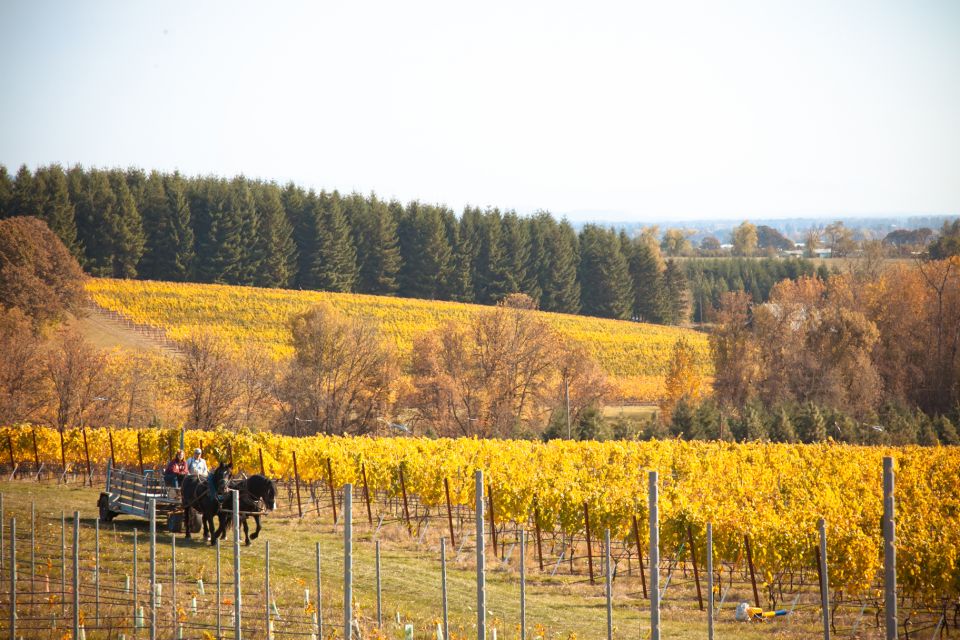
At Illahe, their goal is to make wine as naturally as possible, from the soil to the bottle. To achieve their goal, the team works by hand on small lots, using age-old techniques and materials. There are no enzymes or additives, and they don’t fine or filter their pinot noir. Some lots are made entirely by hand, with no electricity or mechanization at all, using a gentle wooden basket press to process their grapes at harvest, as was done in days gone by.
As one of Oregon’s few horse-powered vineyards, Illahe uses a team of Percheron draft horses to mow and deliver grapes to the winery at harvest. As a bonus, they produce compost along the way! The winery also takes advantage of modern-day advancements, incorporating solar panels and rainwater collection systems.
SUN-WORHIPPING WINERIES
Domain Drouhin Oregon may have been one of the first wineries in the state to install solar power generators, but King Estate now has the largest known solar system on a Pacific Northwest winery. The panels generate enough energy to power the winery and approximately 100 residential homes. King Estate claims to have offset 737,645 pounds of CO2 since March 2012 (as much as 351 mature trees), all while making great wine and managing over 1,000 organically farmed acres of grape vines.
The following wineries have implemented solar power:
Cowhorn Vineyard
Wine Country Farm
So many Oregon wineries are finding creative sustainable solutions. Here are a few more.
1) Several years ago, August Cellars took a leap and installed a 50-kilowatt wind turbine. At the time they installed it, they estimated that it would generate approximately 65 percent of the winery’s electrical needs. August Cellars is not only reducing their immediate carbon footprint, they also expect to recoup their investment in 10 to 15 years.
2) Willamette Valley Vineyards was the first winery in the world to use cork certified through Rainforest Alliance Forest Stewardship Council standards. They also offer an in-house cork recycling program.
3) Belle Pente practices integrated farming—a tenant of biodynamic farming—by planting grasses and utilizing sheep, goats and chicken for vineyard maintenance and manure mix.
4) Amity Vineyards produces Eco-Wine, Oregon’s first organic and sulfite-free pinot noir.
Earth Day is just one day, but when a company chooses to make a commitment to better practices and reducing their carbon footprint, they will benefit others for years to come. By visiting and/or supporting these ecologically focused wineries, you are not only drinking to your health, but to a healthier planet as well. Cheers to that.

